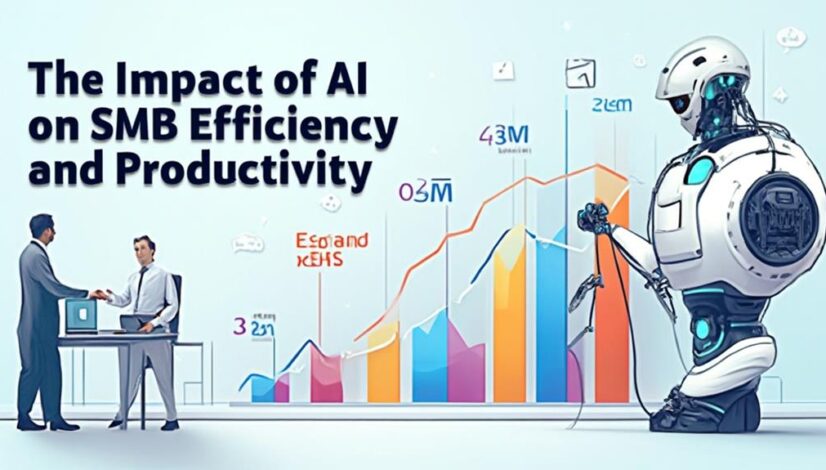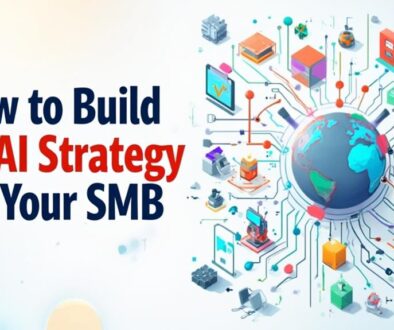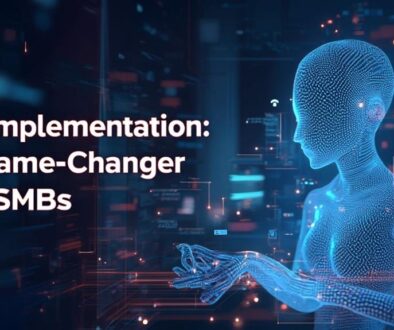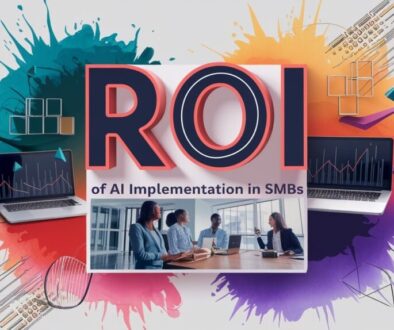The Impact of AI on SMB Efficiency and Productivity
The integration of AI in small and medium-sized businesses (SMBs) greatly enhances operational efficiency and productivity. AI automates routine tasks, potentially saving up to 30% of operational time, thereby allowing employees to focus on higher-value activities. Tools like advanced analytics facilitate data-driven decision-making, providing essential insights that optimize resource allocation and streamline workflows. Additionally, AI-driven customer engagement tools foster personalized interactions, boosting customer loyalty. By embracing AI, SMBs are not only reducing costs but also accelerating innovation and adaptability, positioning themselves competitively in the market. The evolving landscape suggests further opportunities for growth and transformation.
Key Takeaways
- AI enhances operational efficiency in SMBs by automating routine tasks, potentially saving up to 30% of operational time.
- Adoption of AI tools can increase productivity by up to 30%, fostering collaboration and streamlining workflows.
- Data-driven insights from AI analytics empower SMBs to make informed decisions, optimize resource allocation, and respond quickly to market demands.
- AI-driven customer engagement tools personalize interactions, improving customer satisfaction and loyalty while driving profitability.
- Investing in employee training for AI collaboration leads to higher job satisfaction and fosters a culture of innovation in SMBs.
Understanding AI in SMBs

In today's rapidly evolving business landscape, small and medium-sized businesses (SMBs) are increasingly turning to artificial intelligence (AI) to enhance operational efficiency and drive growth. However, the integration of AI into SMBs is not without its challenges.
To begin with, understanding AI fundamentals is essential; many businesses harbor misconceptions about its capabilities, assuming that it is mainly suited for large enterprises or that it requires exorbitant investments.
Addressing common SMB challenges, such as resource constraints and limited technical expertise, requires effective implementation strategies. Cost considerations must also be at the forefront of decision-making; SMBs must assess not only the financial outlay for AI tools but also the potential long-term savings and revenue growth they can generate.
Moreover, successful technology integration hinges on workforce adaptation, as employees may require training to harness the new systems effectively. This leads to the necessity of outlining robust training requirements, guaranteeing that staff can operate alongside AI without feeling overwhelmed or at risk of redundancy.
Beyond these operational aspects, SMBs must also navigate ethical implications inherent in AI use, particularly concerning data privacy and fairness. Scalability issues pose another layer of complexity; businesses looking to grow must confirm that their AI solutions can scale accordingly.
Key Benefits of AI Adoption
The implementation of artificial intelligence (AI) brings numerous strategic advantages that can greatly elevate the operational capacity of small and medium-sized businesses (SMBs). One of the most significant benefits is cost reduction. AI facilitates automation of routine tasks, thereby allowing SMBs to allocate resources more efficiently. This shift not only lowers operational expenses but also increases the potential for profitability.
Workforce transformation is another essential aspect of AI adoption. It empowers employees by augmenting their capabilities, offering tools that enhance productivity rather than replacing jobs. This evolution fosters a culture of continuous learning and adaptability, equipping the workforce with skills aligned to the future marketplace.
Furthermore, AI provides valuable customer insights, enabling businesses to tailor their offerings and improve customer engagement. By analyzing data patterns, SMBs can gain a competitive advantage, effectively differentiating themselves in crowded markets.
Complementing these efforts, process optimization through AI solutions streamlines workflows, eliminates bottlenecks, and enhances service delivery.
Moreover, the acceleration of innovation becomes feasible as AI catalyzes rapid experimentation and deployment of new ideas. This dynamic capacity allows SMBs to pivot quickly in response to market demands, thereby fostering a resilient operational framework.
AI Tools for Enhanced Productivity

Leveraging AI tools greatly boosts productivity by automating tasks and enabling more efficient workflows within SMBs. The implementation of AI collaboration tools provides a tangible pathway for small and medium-sized businesses to optimize their operations. Various studies demonstrate that organizations utilizing these tools can experience productivity increases of up to 30%, substantially impacting their bottom line.
AI collaboration tools such as project management software, communication platforms, and document-sharing applications streamline team interactions and resource allocation. By centralizing information and facilitating real-time updates, these tools minimize the lag caused by traditional communication methods.
Businesses can capitalize on workflow optimization by employing AI algorithms to analyze project timelines, resource utilization, and team performance. This data-driven approach allows for informed decision-making, ensuring that efforts are aligned with strategic objectives.
Moreover, AI-powered analytics help SMBs identify bottlenecks and areas for improvement across various processes. When organizations can pinpoint inefficiencies, they can deploy targeted strategies to enhance workflows, thus maximizing output without necessitating additional resources.
According to a report by McKinsey & Company, businesses that effectively harness AI for workflow optimization can reduce project completion times by 20-50%.
In the evolving landscape of SMB operations, embracing AI tools not only fosters a more collaborative environment but also empowers teams to focus on high-value tasks. In doing so, businesses can attain an agile competitive edge, paving the way for sustained growth and innovation in a fast-paced market.
The careful selection and implementation of these tools serve as a cornerstone for future success in the digital economy.
Automating Routine Tasks
Routine tasks often consume considerable amounts of time and resources within small and medium-sized businesses (SMBs), hindering overall productivity and innovation. Automating these tasks can lead to substantial improvements in efficiency. For instance, a 2020 report by McKinsey revealed that automation could potentially save SMBs up to 30% of their operational time, effectively reallocating hours towards more strategic activities.
AI technologies are capable of streamlining various routine processes, including data entry, invoicing, and customer communication. By implementing workflow optimization techniques, businesses can considerably reduce the time spent on these monotonous tasks. For example, using AI-powered chatbots can automate customer inquiries, allowing staff to focus on complex customer service issues that require human intervention.
Moreover, adopting task prioritization strategies is essential in maximizing the benefits of automation. By identifying which tasks are most resource-intensive and time-consuming, SMBs can strategically automate these processes first, yielding immediate returns on investment. Brands that leverage task prioritization in conjunction with automation often find that they experience reduced operational costs and improved employee morale, as staff can engage in higher-value work.
Ultimately, automating routine tasks fosters a culture of innovation, enabling SMBs to focus on growth opportunities. The financial implications are profound—companies harnessing these advancements report up to a 20% increase in productivity, demonstrating that adopting automation is not merely a trend, but a requisite for survival and success in the competitive business landscape.
Data-Driven Decision Making

Data-driven decision making is fundamentally transformed through enhanced analytics capabilities, enabling SMBs to leverage vast amounts of data for strategic insights.
The utilization of predictive insights not only identifies emerging trends but also informs proactive actions, thereby optimizing resource allocation.
Additionally, streamlined reporting processes allow for timely access to critical information, facilitating informed decisions that drive operational efficiency.
Enhanced Analytics Capabilities
The integration of advanced analytics tools has revolutionized the way small and medium-sized businesses (SMBs) approach decision-making processes. With enhanced data visualization techniques, organizations can now transform complex data sets into intuitive and actionable insights. This facilitates more effective performance metrics tracking, enabling SMBs to measure and evaluate their operations accurately.
Additionally, robust data integration solutions provide an all-encompassing view of organizational performance, streamlining processes across departments. Trend analysis empowers businesses to proactively identify shifts in consumer behavior, which is essential for effective customer segmentation. Such insights allow companies to tailor their strategies, ultimately improving customer satisfaction and loyalty.
Real-time insights are another critical advantage; they enable SMBs to make informed decisions swiftly, staying ahead in competitive markets. Coupled with competitor benchmarking, businesses can assess their positioning and strategically navigate market challenges.
Moreover, a strong focus on data governance guarantees that data integrity and security are maintained, fostering trust in the analytics process. Collectively, these capabilities not only enhance operational efficiency but also empower SMBs to leverage their data for sustained growth and innovation.
Predictive Insights Utilization
Leveraging predictive insights has emerged as a game-changer for small and medium-sized businesses (SMBs) looking to enhance their decision-making processes. By employing predictive analytics, SMBs can transform data trends into actionable business forecasting, considerably improving their capacity for strategic planning. This data-driven approach facilitates accurate sales predictions, allowing organizations to anticipate customer behavior and adjust their strategies accordingly.
Furthermore, predictive insights play a vital role in risk assessment, enabling SMBs to identify potential hurdles before they impact operational efficiency. By understanding market insights, businesses can make informed decisions regarding resource allocation, ensuring ideal use of available assets while minimizing waste.
As a result, SMBs can achieve performance enhancement across various departments, boosting their overall productivity. The ability to harness this information empowers businesses to remain competitive in an increasingly dynamic market landscape, allowing for a blend of agility and strategic foresight.
Fundamentally, the utilization of predictive insights is not merely an added advantage; it is becoming an essential competency for SMBs aiming to thrive in the modern economy.
Streamlined Reporting Processes
Recognizing the complexity of information management, SMBs are increasingly adopting streamlined reporting processes to enhance their data-driven decision-making capabilities.
The evolution of artificial intelligence (AI) has fundamentally transformed report generation, allowing businesses to automate data extraction and visualization, which greatly reduces manual effort and errors. This enhanced efficiency paves the way for timely insights that are essential for informed strategic planning.
Utilizing AI-driven tools, SMBs can establish thorough efficiency metrics that measure various performance indicators, including sales trends and customer engagement levels. By leveraging these advanced analytics, businesses can quickly adapt to market changes, identify areas for improvement, and allocate resources more effectively.
Moreover, streamlined reporting processes facilitate real-time data access, enabling teams to generate and analyze reports on demand. This agility not only fosters a culture of continuous improvement but also empowers decision-makers with the freedom to explore innovative strategies without the constraints of traditional reporting delays.
Ultimately, by embracing these AI-enhanced methodologies, SMBs can maximize their operational efficiency and maintain a competitive edge in an increasingly data-driven marketplace.
AI and Customer Engagement
Artificial intelligence (AI) has emerged as a transformative force in customer engagement, reshaping the way small and medium-sized businesses (SMBs) interact with their clientele. By leveraging AI-driven marketing tools, SMBs can offer personalized interactions, fostering a deeper connection with customers. This is essential in the competitive landscape where customer expectations are continuously evolving.
One significant advancement is chatbot integration, which provides instant automated responses, greatly enhancing customer experience. These chatbots are adept at resolving inquiries around the clock and can efficiently gather customer feedback. The data obtained can be analyzed to uncover behavioral insights, enabling businesses to tailor their offerings and communication strategies effectively.
Furthermore, the implementation of sentiment analysis allows SMBs to gauge the emotional tone behind customer feedback. This insight is invaluable for adjusting strategies to improve service delivery and product relevance.
Omnichannel engagement, powered by AI, guarantees a consistent customer experience across multiple platforms. By understanding customer preferences through various touchpoints, businesses can deliver timely and relevant messages.
Such innovative practices not only streamline operations but also empower SMBs to make data-driven decisions. As a result, organizations can enhance customer loyalty and satisfaction, ultimately driving profitability.
In a time when personalization is paramount, AI acts as a catalyst, helping SMBs meet the diverse needs of their clientele while maintaining operational efficiency. By embracing these technologies, SMBs position themselves for growth in a dynamic market.
Future Trends in AI and SMBs

As small and medium-sized businesses (SMBs) continue to navigate an increasingly competitive landscape, the future of artificial intelligence (AI) promises to greatly shape their operational strategies and customer interactions. The anticipated trends in AI adoption indicate a profound transformation in workforce dynamics, with a growing emphasis on technology integration. A recent study indicates that 80% of SMBs foresee AI tools playing a vital role in streamlining business processes, enhancing productivity, and ultimately fostering a competitive advantage.
One significant trend is the evolution of AI ethics in the deployment of these tools. As more SMBs adopt AI solutions, it is imperative they consider ethical implications, such as data privacy, bias mitigation, and transparency in automated decision-making. This conscious approach to AI ethics not only fosters customer trust but also aligns with increasingly stringent regulations, paving the way for sustainable growth.
Additionally, workforce transformation, driven by AI, will redefine job roles and skill requirements. Businesses will need to invest in employee training programs that enable teams to collaborate effectively with AI technologies. This shift could result in higher job satisfaction and innovation, as employees take on more strategic and creative functions while leveraging AI for routine tasks.
Ultimately, as SMBs harness AI capabilities, they can anticipate improved efficiency in operations and a revitalized focus on customer service. The integration of AI across various facets will not only enhance productivity but also secure a pivotal position in the evolving market landscape.
Frequently Asked Questions
How Can SMBS Assess Their Readiness for AI Implementation?
To assess their readiness for AI implementation, SMBs should conduct a thorough readiness assessment that evaluates existing data infrastructure, identifies implementation challenges, and determines required employee training.
This process involves analyzing current workflows, technological capabilities, and staff competencies.
What Budget Considerations Should SMBS Keep in Mind for AI Adoption?
Steering through the domain of AI adoption resembles charting a course through uncharted waters; careful planning is essential.
SMBs must conduct a thorough cost analysis to identify both initial and ongoing expenses, including software, hardware, and training.
In addition, a thorough ROI evaluation is critical, allowing businesses to forecast potential gains against expenditures.
Are There Specific Industries Where AI Significantly Benefits Smbs?
Specific industries where AI greatly benefits SMBs include retail, healthcare, marketing, finance, and logistics.
In retail automation, AI streamlines inventory management and enhances customer support.
In healthcare analytics, it improves patient outcomes through data-driven insights.
Marketing personalization optimizes customer engagement and retention.
Financial forecasting enhances budget accuracy, while supply chain optimization increases operational efficiency.
These tailored applications of AI empower SMBs to compete more effectively in their respective markets.
How Do SMBS Measure the Success of Their AI Initiatives?
Small and medium-sized businesses (SMBs) typically measure the success of their AI initiatives through various success metrics and performance indicators.
Key metrics may include ROI, productivity enhancements, customer satisfaction scores, and operational efficiencies.
By analyzing these indicators, SMBs can determine the effectiveness of their AI applications, enabling them to make informed adjustments.
The ongoing evaluation promotes a continuous improvement culture, ensuring that AI technology aligns with strategic objectives and enhances overall business freedom.
What Skills Are Essential for SMB Staff When Using AI Tools?
In traversing the evolving landscape of technology, essential skills for SMB staff encompass AI training, user adaptability, and data literacy.
The art of tool selection is critical, as is the integration of AI into existing workflows. Mastery in change management guarantees smooth shifts, while continuous learning fosters resilience.
Finally, ethical considerations remain paramount, shaping responsible usage of AI technologies.
Together, these competencies empower SMBs to harness AI's potential effectively and responsibly.
Conclusion
The integration of artificial intelligence within small and medium-sized businesses serves as a transformative catalyst, enhancing operational efficiency and productivity. By automating routine tasks and facilitating data-driven decision-making, AI empowers organizations to navigate the complexities of modern markets with agility. As customer engagement practices evolve and future trends emerge, the potential for AI to redefine business landscapes beckons like a siren's call, urging SMBs to embrace innovation as a means to thrive in an increasingly competitive environment.




